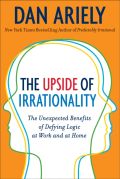 Dan Ariely’s previous book on behavioral economics, Predictably Irrational was fantastic. It explored the way that economics work on a personal level when you stop assuming that people are completely irrational and provided a great overview of the many kinks in the human brain that lead us to make weird, suboptimal decisions. His new book, The Upside of Irrationality, flips that coin onto its other side and looks at hour our penchant for irrational decision-making can actually benefit us and make us better off. Or how it could if we let it.
Dan Ariely’s previous book on behavioral economics, Predictably Irrational was fantastic. It explored the way that economics work on a personal level when you stop assuming that people are completely irrational and provided a great overview of the many kinks in the human brain that lead us to make weird, suboptimal decisions. His new book, The Upside of Irrationality, flips that coin onto its other side and looks at hour our penchant for irrational decision-making can actually benefit us and make us better off. Or how it could if we let it.
Like in his last book, Ariely draws from a deep well of research conducted by himself and his colleagues in order to provide context for everything he discusses. What I love about this aspect of the book is how clever off-the-wall many of the experiments are. Ariely and company send researchers to villages in India to measure the surprising effect of extravagant rewards on task performance. They construct fake and experimental online dating sites to see how we might better construct our online interactions to capitalize on what it really is that people –especially those of us south of “supermodel” in the looks department– look for in a mate. They talk about subjecting lucky subjects to massages and unlucky ones to excessive vacuum cleaner noise in order to see how we adapt to pleasure or pain. And a lot more. Every chapter contains descriptions of scientific research, but it’s almost all really interesting and takes you to conclusions that will stick with you.
So while I still think Predictably Irrational is the better of the two books because it’s more interesting and instructuve to see how people fail than to see how they might succeed, The Upside of Irrationality is still a very quick and very interesting read. What’s better, it’s practical and may change how you think about your own behavior.
Published by